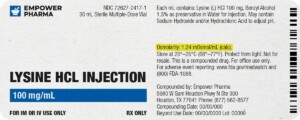Atropine; Hyoscyamine; Phenobarbital; Scopolamine: (Moderate) Phenobarbital use for greater than one year while taking biotin can lead to decreased concentrations of biotin. Anticonvulsants that are potent CYP3A4 inducers, like phenobarbital, are thought to increase biotin metabolism, leading to reduced biotin status and inhibition of intestinal biotin absorption. This can result in decreased efficacy of biotin. Discuss biotin status with patients taking these medications concomitantly. [1]
Belladonna Alkaloids; Ergotamine; Phenobarbital: (Moderate) Phenobarbital use for greater than one year while taking biotin can lead to decreased concentrations of biotin. Anticonvulsants that are potent CYP3A4 inducers, like phenobarbital, are thought to increase biotin metabolism, leading to reduced biotin status and inhibition of intestinal biotin absorption. This can result in decreased efficacy of biotin. Discuss biotin status with patients taking these medications concomitantly. [1]
Carbamazepine: (Moderate) Carbamazepine use for greater than one year while taking biotin can lead to decreased concentrations of biotin. Anticonvulsants that are potent CYP3A4 inducers, like carbamazepine, are thought to increase biotin metabolism, leading to reduced biotin status and inhibition of intestinal biotin absorption. This can result in decreased efficacy of biotin. Discuss biotin status with patients taking these medications concomitantly. [1]
Ethanol: (Moderate) Excessive ethanol (e.g., alcoholism) may result in increased urinary excretion of magnesium. Avoid high intakes of ethanol while taking magnesium salts. [5][6]
Food: (Minor) Dietary avidin, a glycoprotein in raw egg whites (food), binds tightly to dietary biotin and prevents its absorption in the gastrointestinal tract. Cooking denatures the avidin, disabling it from interfering with biotin absorption. [1]
Fosphenytoin: (Moderate) Fosphenytoin use for greater than one year while taking biotin can lead to decreased concentrations of biotin. Anticonvulsants that are potent CYP3A4 inducers, like fosphenytoin, are thought to increase biotin metabolism, leading to reduced biotin status and inhibition of intestinal biotin absorption. This can result in decreased efficacy of biotin. Discuss biotin status with patients taking these medications concomitantly. [1]
Phenobarbital: (Moderate) Phenobarbital use for greater than one year while taking biotin can lead to decreased concentrations of biotin. Anticonvulsants that are potent CYP3A4 inducers, like phenobarbital, are thought to increase biotin metabolism, leading to reduced biotin status and inhibition of intestinal biotin absorption. This can result in decreased efficacy of biotin. Discuss biotin status with patients taking these medications concomitantly. [1]
Phenytoin: (Moderate) Phenytoin use for greater than one year while taking biotin can lead to decreased concentrations of biotin. Anticonvulsants that are potent CYP3A4 inducers, like phenytoin, are thought to increase biotin metabolism, leading to reduced biotin status and inhibition of intestinal biotin absorption. This can result in decreased efficacy of biotin. Discuss biotin status with patients taking these medications concomitantly. [1]
Primidone: (Moderate) Primidone use for greater than one year while taking biotin can lead to decreased concentrations of biotin. Anticonvulsants that are potent CYP3A4 inducers, like primidone, are thought to increase biotin metabolism, leading to reduced biotin status and inhibition of intestinal biotin absorption. This can result in decreased efficacy of biotin. Discuss biotin status with patients taking these medications concomitantly. [1]


 Hair Restore D Scalp Solution
Hair Restore D Scalp Solution Hair Restore Ultra Scalp Solution
Hair Restore Ultra Scalp Solution Scar PT Gel
Scar PT Gel GHK-Cu Scalp Solution
GHK-Cu Scalp Solution Rosacea AIMN Cream
Rosacea AIMN Cream Anti-Aging Siro Gel
Anti-Aging Siro Gel Biotin / Minoxidil Capsules
Biotin / Minoxidil Capsules Biotin / Finasteride / Minoxidil Capsules
Biotin / Finasteride / Minoxidil Capsules Rosacea INO Gel
Rosacea INO Gel Acne DNS Gel
Acne DNS Gel